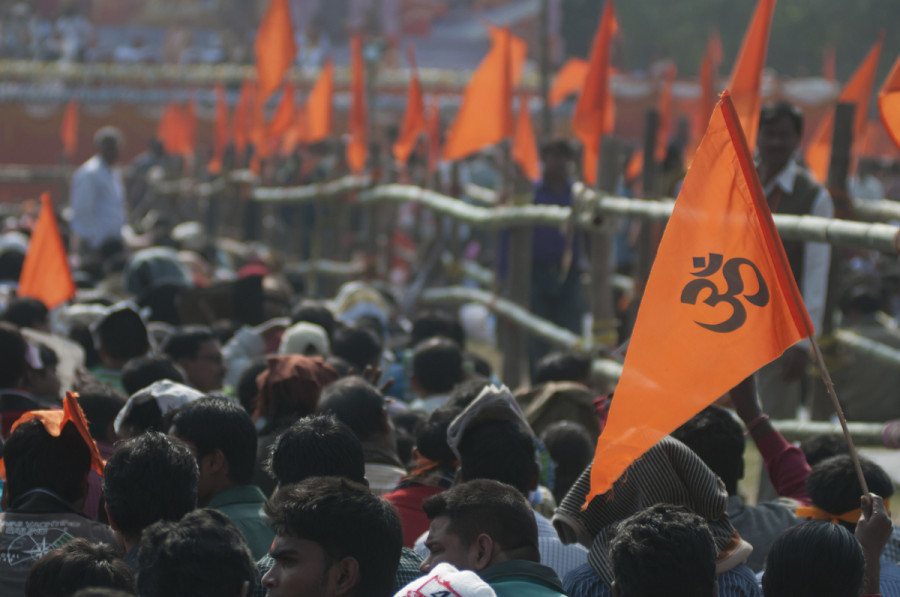Columns
Hey Bhagwan
Politicising religion in Nepal has the potential to create major social and religious conflicts.
Naresh Koirala
Karl Marx, the founder and primary theorist of Marxism, viewed religion as the "opium of the masses". Vladimir Lenin, the founder of the Soviet Union, said, “A true communist would always promote atheism and combat religion.” During the first two decades of the Soviet Union, “some 200,000 members of the clergy were murdered”. Mao Zedong established state atheism in the People's Republic of China. He considered popular religious movements seditious. The Chinese Communist Party’s national security agency monitors citizens' religious activity.
Until recently, atheism was quite popular amongst Nepali communists as well. Both KP Sharma Oli and Prachanda, two of Nepal’s most prominent communist leaders and former prime ministers, have, on several occasions in the past, publicly disparaged religion. KP Sharma Oli is on record saying, “If there is any God, it is only in Karl Marx.” During their insurgency, Prachanda’s Maoist comrades slaughtered cows and forced devout Hindus to eat the meat. These leaders make all their important decisions under the watchful gaze of the trinity of atheism—Marx, Lenin, and Mao—who adorn their official meeting rooms.
Lately, with the demand for declaring Hinduism the country’s state religion getting louder, these leaders suddenly seem to be on the way to becoming reborn Hindus. This is an ideological apostasy, but it is happening. When did the turnabout start, and what will be its impact?
The turnabout
Oli's image building as a proponent of Hindu gods took a paradoxical route. It started about three years ago with the arrival of Hak Ja Han, the leader of a Korean Christian cult, the Unification Church. She had come to Kathmandu at Oli’s invitation when he was prime minister. The finale of Han’s programme was Oli and then his comrade, Madhav Kumar Nepal, publicly drinking wine blessed by Han (derisively described in Nepal media as “drinking holy wine”).
This reverence to the leader of a Christian cult, previously prosecuted in the United States for criminal activity, by the prime minister of a secular country, did not go down well. It was severely criticised by the media and Oli’s senior colleagues in the UML.
Oli’s ongoing trouble within his party for poor governance, hubris and corruption started intensifying soon after Han’s visit. Oli had to divert public attention from the troubles in his leadership, and he decided to use Hinduism as the means. Out of the blue, one fine day in July 2020, he declared that the Hindu god, Ram, was born in Nepal. This helped him find the diversion he needed: Whip up religious nationalism and win support from gullible Hindus. Until now, the Indians had claimed Ayodhya as the birthplace of Ram. The declaration was a direct challenge to India. “Standing up to India” pays well in Nepali politics.
From here on, Oli’s public acts of “dedication” to Hindu gods intensified. He ordered replacing the existing shower (jalahari), made of silver, at the Pashupatinath Temple with a shower made of gold at the cost of millions in public money, and building a new temple of Ram, Sita, Laxman and Hanuman in “Ayodhyapuri” in Chitwan district, the district of his political nemesis Prachanda.
Prachanda, the Maoist chairman, could not stay quiet. He had been seen before actively participating in some of the most traditional (Saptaha) and regressive Hindu religious practices (for example, votive offerings of a live buffalo). It garnered intense criticism at the time, but it was forgotten until his photographs with Ramdev recently appeared in the media. The controversial Indian yoga guru, billionaire businessman and proponent of Hindutva was visiting Nepal and had gone to see Prachanda the day he arrived.
One of the photos shows Prachanda, Ramdev, and Ramdev’s assistant sitting in Prachanda’s ornate living room which included, amongst others, several shiny Buddha idols. The juxtaposition of Buddha idols, a Hindu guru and a communist leader, stained with the blood of the thousands killed in the failed insurgency he led, raised numerous questions. Was the soul of the dead beginning to haunt him that he was seeking solace in god? Or was he using religion to further his political agenda? No one knows the answer, but desperate communists seeking religion to further their politics is not uncommon.
About eight years ago, the general secretary of the Communist Party of the Russian Federation, Gennady Zyuganov, became a passionate supporter of the Russian Orthodox Church—his ploy to capture the votes of devout Russians. “Lenin wanted to build a society similar to what Jesus Christ wanted; Christ was the first communist," he says. Cuba is deeply Catholic. A 20-metre high The Christ of Havana overlooks the city of Havana from a hilltop. After denying Christians membership in the Communist Party for years, Fidel Castro called Christ a revolutionary and removed atheism from the country’s statute.
Deuba joins the fray
Sher Bahadur Deuba, current prime minister and president of the Nepali Congress, concerned with the communists targeting Hindu votes, would not be left behind. Cognisant of Ramdev’s popularity in Nepal, he inaugurated the establishment of two television channels dedicated to the promotion of Hinduism. Both channels are owned by Ramdev. This was a rather hurried, clumsy show. Ramdev’s TV has, as yet, no licence to operate in Nepal. A bureaucrat commented, “Deuba was just inaugurating the TV’s logo, not the channel!"
If the leaders have turned to religion to recompense for their unsavoury past, it is their private matter and is a good thing. But for the government to promote any particular religion is against the spirit of the country’s secular constitution. Politicising religion in a country with religious and cultural diversity like Nepal has the potential to create major social and religious conflict. This should worry us all.
My friend Hemesh captured the sentiments of many exasperated with the politicisation of religion and the hypocrisy of the politicians, “Hey Bhagwan,” (Oh God) he sighed. “Hey Bhagwan'' indeed!




 20.12°C Kathmandu
20.12°C Kathmandu















